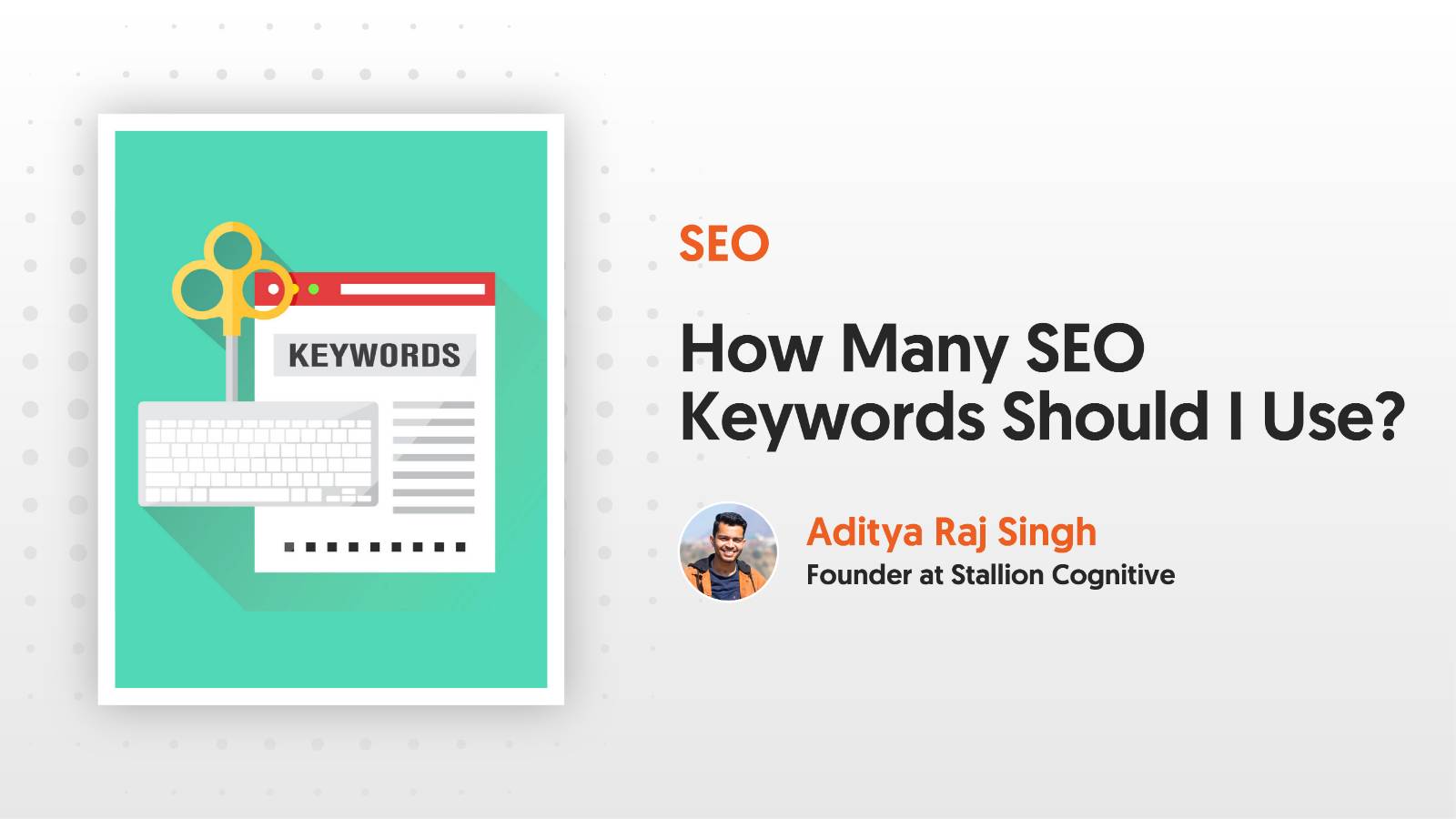For your company website to be successful, it's crucial to choose the right keywords so that they can be discovered and indexed by search engines. It's a great starting point for converting users into customers, expanding online business, and eventually your ROI. However, this can only be accomplished by carefully selecting keywords and using them at optimal densities and in the most effective ways.
Wondering how many keywords you should target? How many keywords should you focus on per page? Should you use the same keywords on every page? and how to use keywords in your content?
Well, that's a complicated question, but the answer is surprisingly straightforward. We'll answer it completely in this blog post. Keep reading while we're sharing some of the most important things you should know about using keywords.
Why are SEO Keywords Important?
Before moving ahead, let's explore what SEO keywords are and why they are important.
What Are SEO Keywords?
SEO keywords can be anything from a single word to a long phrase. They are used to shape a website's content so that it gets more relevant traffic from organic search results.
They are what people find when they search for terms associated with your company or business. When properly explored and improved, keywords serve as a bridge between your target audience and the site itself.
Why Keywords Matter in SEO?
Keywords are crucial because they connect your content to what people are looking for. The keywords you select to target will affect the kind of traffic you receive from search engines, which is why you want to rank high so that users can find your site in the SERPs. For instance, If you own a golf store, you could want to rank for the term "new clubs," but you should be aware that doing so might bring in customers who are really looking for a new nightclub.
Keywords are as much about your target market as they are about the subject matter you're writing about, as the way you describe your goods or services may vary somewhat from how others are looking for them. If you want your content to rank highly organically and get people to your site, you need to know what those people are looking for, how they talk, and what they like to read. This may be accomplished via surveys, focus groups, in-depth interviews, and keyword research.
How Many Keywords Per Page for SEO?
To get started, choose one main keyword per webpages while also including two or more additional keywords. For each webpage, select one primary keyword and at least two secondary keywords.
The Subject of Your Page
Say, for example, you're the owner of a women's clothing eCommerce site. The clothes are obviously the focus of my website, but what should I title them?
To find this out, you may use a keyword research tool, such as the Google Keyword Planner. That'll give you a rough idea of how often people use terms like "formal wear," "casual wear," "sportswear," "lingerie,"
Let's imagine you've decided to use "casual wear" as an example.
Varieties of that Subject
Once you've settled on a target term, it's time to think about the wide varieties at your disposal.
For example, you may stock a wide variety of casual wear, including pants, t-shirts, shorts, jeans, sweatshirts, jumpers, pullovers, jackets, and more.
Alternatively, you may have everything on a single, comprehensive product page. If that's the case, "women's clothes" may stand in for just about anything until you add in more particular connections.
Categorize all Those Varieties
Last but not least, you must ensure that your site's presentation of different options is intuitive for visitors and search engines. To do this, you must provide supplementary material for each variant of a term you want to rank for.
For this reason, you should include a link specifically for "casual wear" from your "women's clothes" page. They should be able to simply go to the "affordable casual wear" and "brand name casual wear" pages as well.
The content of the pages should be tailored specifically to that keyword. More specificity increases the likelihood of those sites ranking for more particular keywords.
More precise information relevant to that term should be included on those pages. The more detailed you can be, the higher those sites will rank for even more niche terms.
Thanks to this example, we can now answer the first question.
How Many Keywords Should You Target?
You shouldn't limit yourself to a single term that you think sums up your product or service best if you want to get the most out of your SEO approach. Rivals often use first-choice keywords unless your company has a completely distinct and single focus. Even if the keyword or phrase is perfectly suitable, there may be a lot of competition for first place in search results from other companies that provide services comparable to yours.
Implementing SEO successfully requires more than narrowing your attention to one key part of your organization or allocating all your resources. Use around five keywords that work well together and set you apart from the competition for maximum impact.
The conversion rate is increased by using long-tail keywords, which are phrases of three words or more. They aid in sending site visitors more likely to represent the niche audience you're aiming for. Gaining a better position in search engine results is just the beginning; carefully selecting and using a sufficient number of keywords also helps in converting site visitors into paying clients.
Using many keywords improves your site's search engine score, but avoid using completely unrelated terms or phrases. Simultaneously, your keywords shouldn't do anything more than repeating the same thing in multiple ways. Keyword stuffing is useless because of modern search engine optimization strategies. It is important to consider reader interest and purpose when deciding how many numerous and related keywords to utilize.
Should I Use the Same Keywords On Every Page?
You shouldn't repeat the same terms over and over again. Each page has to focus on a different group of keywords. Using the same keywords across your site will lead to a battle for the search engine's attention. It's recommended to never duplicate a term on another page.
The practice of using too many similar keywords (called keyword cannibalization) might hurt your search engine optimization and page rank. Keep note of the keywords you're using on each page of your site to avoid keyword cannibalization.
What Is the Ideal Keyword Density?
Simply said, there is no "right" answer. The keyword density is relative to the content and the kind of term used.
As per Smart Insights, "long-tail keyword searches have a click-through rate 3-5% higher than generic searches."

For instance, if you're going for long-tail keywords, a less keyword density is appropriate. However, more keyword density is required when aiming for highly competitive short tail keywords. Using too many long-tail keywords in your blog post can make it complicated and boring. However, Short tail keywords, such as those consisting of a single word, can make it a bit engaging and interesting.
If you're unsure how much emphasis you should put on each term, check out the highest-ranking blogs that are comparable to yours. Have a look at the keyword density they have managed to keep up. Find a way to optimize the keyword placement better than them. Maintain the same amount of emphasis on keywords.
How to Use Keywords in Your Content
Databox revealed that "36% of SEO experts thought the headline/title tag was the most important SEO element."

The most important areas to include keywords for search engine optimization are listed below.
Page Titles
As an element of technical SEO, optimizing page names is an excellent place to begin incorporating keywords. If you want Google and users of search engines to understand what your website is about, you should provide them with a title that accurately conveys the content.
Meta Description
This is a simple yet sometimes ignored method of including keywords for search engine optimization. The meta description serves as a brief synopsis of the content; including the keyword here improves your search engine results ranking. Having one or two of your most important keywords tied to the section of your page immediately delivered up by search engines is a great strategy.
Subheadings
Adding subheadings makes the information more scannable, making content more engaging. Subheadings may help readers in determining whether or not the information presented is useful to them. They may also be found in the form of featured snippets.
Title
Always try to include the term in the title of your content. Since Google uses the title header and meta description to describe your content, including the term organically in the title is advantageous.
Content
It's important to include your focus keyword inside the first few sentences of your content or in the first paragraph. Besides, include that keyword and its variations into the whole body of the content.
Image
First, if applicable, insert keywords or LSI keywords here. Then, incorporate them into picture titles, the brief descriptions that appear when a mouse hovers over an image. And last, be sure to include relevant SEO keywords in the alt text.
Use Keywords Better in Your Business
As one of the most trusted and professional financial local SEO and website design companies, Stallion Cognitive understands the importance of focusing on the most important keyword phrases for any company's online presence.
We can help get you listed on Google, Bing, and the other major search engines. To develop a keyword strategy that can propel your company forward, get in touch with us today.


